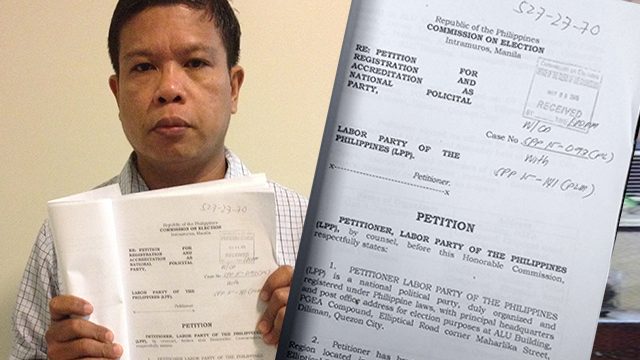SUMMARY
This is AI generated summarization, which may have errors. For context, always refer to the full article.

MANILA, Philippines – A labor-based national political party has sought accreditation from the election commission in what the group calls a historic first.
The Labor Party of the Philippines (LPP) on Tuesday, September 1, said it plans to endorse and field national and local candidates for the 2016 polls once it is accredited.
The LPP underwent an accreditation hearing before the Commission on Elections (Comelec) last August 25, Rappler learned.
Associated Labor Unions (ALU) Vice President Gerard Seno told Rappler the party will “support” a presidential candidate. LPP Chairman Alan Tanjusay said the presidential bet will be selected “after they make their candidacy official in October.”
LPP has been courted as early as February by “decent groups and highly respected individuals” for the support of certain national candidates, Tanjusay told Rappler.
The party was established by ALU in December 2014 as hopefully the country’s first union-based national political party.
Tanjusay said that LPP will partner with other grassroots, marginalized, business, and community-based groups to beef up the present 120,000 regular union members of ALU.
He said the party envisions “a dynamic economy, a just society, an open democracy and a healthy environment.”
LPP was formed out of “discontent, frustration, because no one is giving even small attention” to the issues of workers “who play a vital and strategic role in the country’s national daily affairs,” Tanjusay added.
ALU is a pioneering federation of labor unions registered with the labor department in April 1954.

What the labor sector wants
Unionists believe the country’s next leader must succeed where they believe past and present presidents have failed – ensuring Filipino laborers have a living wage enough to move out of poverty.
“Naghahanap pa kami ng pangulo na maninindigan at isusulong ang disenteng pamumuhay ng manggagawa at kanyang pamilya lalo sa sitwasyon ngayon na kung saan hindi nakikinabang ang nakararami sa pag-unlad ng ekonomiya,” trade unionist Renato Magtubo told Rappler.
(We are still looking for a president who will stand and push for decent living of workers and their families especially today when many do not benefit from economic progress.)
But according to Labor Secretary Rosalinda Baldoz, only 5 of the 98 minimum wage rates in the country remain below the poverty threshold – a feat, she said, that was achieved under President Benigno Aquino III from 2010 to June 2015.
Baldoz also said more workers received higher salaries under Aquino’s administration given the labor department’s two-tier wage system.
Labor leader Josua Mata described a pro-labor president as one who is “not afraid to go against the interests of the elites, pursue much-needed hard reforms like asset reforms and security of tenure for workers to address the scandalous inequality that we have.”
Contractual labor – seen to deprive workers of income stability and job security – comes at the forefront of issues the labor sector wants political leaders to prioritize. (READ: SONA 2015: The state of Philippine labor under Aquino)
Julius Cainglet of the Federation of Free Workers said the labor sector needs a leader who “will ensure that growth redounds” to “the working poor and those who work under precarious conditions such as contractualization, unsafe work places and receiving salaries below the minimum wage.”
Cainglet said the next president must treat trade unions “as regular social dialogue partners” and “involve them in labor and economic policies.”
The call comes amid waning interest in unionism and decreasing labor union density in the Philippines. (READ: Factory work and unionism). – Rappler.com
Add a comment
How does this make you feel?
There are no comments yet. Add your comment to start the conversation.